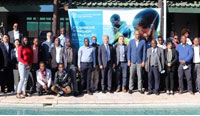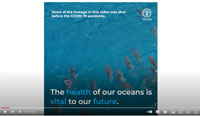News
Fisheries co-management knowledge tools

Guidebook for evaluating fisheries co-management effectiveness
The Guidebook offers a process and method to evaluate the performance of a fisheries co-management system and its plan in order to enhance its effectiveness in delivering benefits and in contributing to environmental, social and economic sustainability and good governance. It is to be used to evaluate the effectiveness of an existing fisheries co-management system operating at a fishery, community or sector level, or in a spatially defined area.

e-Learning course: Evaluating fisheries co-management effectiveness
The course consists of 4 lessons: - Lesson 1 – What is fisheries co-management?
- Lesson 2 – Why evaluate fisheries co-management?
- Lesson 3 – How to evaluate fisheries co-management
- Lesson 4 – Post-evaluation and adaptive management

This handbook, “How it works” complements the FAO Guidebook for evaluating fisheries co-management effectiveness. It includes a brief synopsis of the main topics covered and an overview of the detailed evaluation process described in the Guidebook.

Tools for the Guidebook for evaluating fisheries co-management effectiveness
The online collection of tools and resources can be used in the evaluation process that is described in the Guidebook. The tools and resources may be useful to the planners, evaluation team and participating stakeholders.
Context
Fish has been an essential food for centuries and since the second part of the 20th century its relevance has become more evident, both in terms of benefits for health and nutrition and as a support to the countries’ economies.
One of the main constraints for the sector, which might have a tremendous impact on the environment, is the fish stocks exploitation. An effective management of fish stocks, and a constructive approach to the fisheries co-management can be crucial to tackle social and economic problems which could arise from a poor managing of the natural resources. Fisheries co-management can be a sustainable solution to cope with resource overexploitation, overcapitalization, increased conflicts, loss of livelihoods and reduced incomes, food and nutrition insecurity in a world challenged by uncertainties related to population increase, growing demand for food resources, and climate change.
Activities
SFC aims to support all fisheries stakeholders and policy makers in designing and implementing effective fisheries co-management plans and systems for sustainable fisheries governance.
Therefore, an open and active dialogue with all those involved in the sector along all value chain, especially fishers and fish workers, and at governmental level, is fundamental.
The share of a better understanding of the concept of fisheries co-management is the first step to move towards the development of a series of tools tailored to set and implement well-designed fisheries co-management programs on-the-ground.
In addition to the introduction of locally contextualized community-based fisheries co-management system, this project aims to develop sustainable coastal livelihoods in fishing communities in selected countries. SFC would also investigate challenges and opportunities of the livelihoods of fishing communities, analyse fishers’ perception and stakeholder participation in developing alternative livelihoods and explore good alternatives to strengthen the sustainable management of fishing grounds.
In depth
What is fisheries co-management?
What is fisheries co-management?
With fisheries co-management is meant a mode of governance through which resource users’ and government share responsibility and authority for the management of fishery resources, with support and assistance as needed from other stakeholders, external agents, academic and research institutions.
How can a good fisheries co-management contribute to fisheries economies and enhance population livelihood?
How can a good fisheries co-management contribute to fisheries economies and enhance population livelihood?
This approach is gaining importance particularly in small-scale fisheries, for which local management capacity and responsibility, combined with the support of formal legal frameworks and information/decision-making systems, may offer specific advantages. However, its potential depends on the existing policy and legal environments, local and national support for community-based initiatives.
So far, fisheries co-management has been an active topic area for quite some time, particularly since the endorsement of Voluntary Guidelines on the Responsible Governance of Tenure of Land, Fisheries and Forests in the Context of National Food Security (VGGT) and Voluntary Guidelines for Securing Sustainable Small-Scale Fisheries in the Context of Food Security and Poverty Eradication (SSF Guidelines).
While there is considerable literature about co-management arrangements and outcomes as well as a substantial body of information describing specific co-management cases, the building of this information has yet to be pulled together and analyzed to create a coherent guiding framework with on-the-ground implementation supporting guidance. Lessons learned are still piecemeal; opportunities of co-management are still untapped; and the guidance for local applications of co-management is not yet fully developed.




